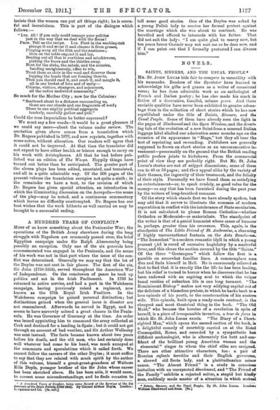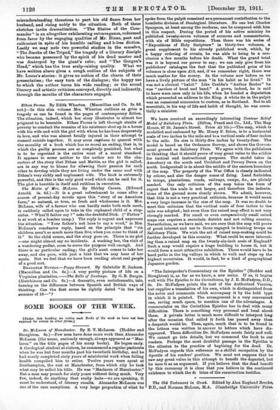NOVELS.
SAINTS, SINNERS, AND THE USUAL PEOPLE.• Ma. ST. JOHN LUCAS bids fair to compete in versatility with his namesake. Readers of the Spectator have learned to acknowledge his gifts and graces as a writer of occasional verse; he has done admirable work as an anthologist of French and Italian poetry ; he has also made his mark in fiction of a decorative, fanciful, urbane genre. And these enviable qualities have never been exhibited to greater advan- tage than in the collection of short stories which he has now republished under the title of Salida, Sinners, and the Usual People. Some of them have already seen the light in the pages of Blackwood and the Open Window, and the divert. ing tale of the evolution of a new Saint from a misread Italian luggage label elicited our admiration some months ago on the occasion of its appearance in "Mager," but they all bear the test of reprinting and re-reading. Publishers are generally supposed to frown on short stories as an unremunerative in- vestment—presumably on the ground that the British reading public prefers joints to kieloshaws. From the commercial point of view they are probably right. But Mr. St. John Lucas's stories are not of snippet dimensions ; some of them run to 40 or tiO pages ; and they appeal alike by the variety of their themes, the ingenuity of their treatment, and the felicity of their style. Personally we have found them as satisfying an entertainment—or, to speak crudely, as good value for the money—as any that has been furnished during the past year by the writers of long-breathed romance.
Of the story which stands first we have already spoken, but may add that it serves to illustrate the romance of modern superstition in conflict with the intolerance of State secularism. It is not calculated to please Roman Catholics—whether Orthodox or Modernist—or materialists. The standpoint of the writer is that of a genial humanist whose sense of humour is, perhaps, greater than his reverence. This, again, is the standpoint of The Little Friend of St. Ambrosius, a charming if highly unconventional fantasia on the Acta Sanctotunk "The Iconoclast" is a modern romantic idyll in which a young
peasant is cured of excessive hagiolatry by a masterful lover,a,nd this closes the section covered by the title "Saints." Of the three " Grotesques " which follow the first is a parable on somewhat familiar lines. A commonplace man dies and finds himself in Hell. He is enormously relieved at first to find that it is exactly like the life lie has been leading, but his relief is turned to horror when he discovers that be has been endowed with an aspiring soul to which the vulgar banal routine of suburban life is one long torment. "The Reminiscent Bishop " makes not very edifying capital out of the delirium of a blameless prelate, in which he harks back to a love episode of his youth, to the consternation of his austere wife. This episode, built upon a ready-made contrast, is the cheapest and most theatrical thing in the book. "The Old Maid," who became the heroine of a revolution in spite of herself, is a piece of irresponsible invention, a tour de force in which Mr. St. John Lucas excels. "The Diary of a Short- sighted Man," which opens the second section of the book, is a delightful comedy of courtship carried on at the Hotel Cosmopoliti, Rome, and recorded by a sympathetic but diffident archaeologist, who is alternately the butt and con- fidant of the brilliant young American woman and the elemental" singer to whom the chief roles are aasigned. There are other attractive characters, too : a pair of Russian enfants terribles and their English governess, a shrewd old Scots lady, and a platitudinarian minor canon. "The Absent Friend" is a study in conscious imitation with an unexpected dinuniment, and " The Friend of the Family " exhibits a rejected suitor, a stupid but kindly man, suddenly made master of a situation in which mutual • Saints, Sinners, and the Usual People. By St. John Lucas. Londoas
William Blackwood and Bons. -
misunderstanding threatens to part his old flame from her husband, and rising nobly to the situation. Both of these sketches invite dramatization. " The Statue of the Com- mander" is an altogether exhilarating extravaganza, redeemed from farce by the engaging qualities of Mr. Binns, poet and enthusiast in spite of his humble calling and h-less diction. Lastly we may note two powerful studies in the macabre, "The Smoke of the Tripod," the tragedy of a literary disciple who became possessed by the spirit of his dead master and was destroyed by the giant's robe; and " The Gorgon's Head," which has the true scalp-raising quality. What we have written above gives a rough outline of the subjects of Mr. Lucas's stories : it gives no notion of the charm of their presentation ; the easy turn of the dialogue ; the happy use to which the author turns his wide reading; or the sound literary and artistic criticism conveyed, directly and indirectly, through the mouths of the characters engaged.



































 Previous page
Previous page